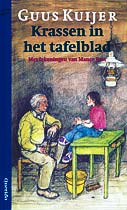Guus Kuijer
Scratches on the Tabletop (Krassen in het tafelblad)
A barred prison window with a head behind
When Daisy’s Grandma dies, the girl realises to her surprise that she barely knew her and that her mother does not seem particularly upset. Daisy goes to stay with her kind, sensible Grandad, to cheer him up a bit in his loneliness. There begins the search for the woman who was her grandmother. Like a cunning, dogged detective, bit by bit she pieces together what has never been talked about in the family and why.
Grandma was an independent woman, with an original frame of mind. She needed to spread her wings, but lacked the courage to defy the restrictive spirit of the times. She gave up her dreams to settle down with her husband. This turned her into an embittered, intolerant wife and mother, with a duster in her hand from dawn ‘til dusk. In the garden house Grandad once built especially for her, Grandma left a sad, but enlightening vestige of her existence: a barred prison window has been scratched into the table top, with a head behind.
Perhaps the finest of all Kuijer’s works, a few years ago this book was successfully turned into an impressive children’s film. The author is brilliant at writing childish dialogue and, as always, succeeds in describing people and situations to a tee with a minimum of words and dry humour. It is a sign of true genius in youth literature to be able to write at a simple level about the real issues that every human life revolves around: the relationships between loved ones and between parents and children. Kuijer presents his characters warts and all. He does not judge, but gently encourages Daisy, the child who, observing with amazement the mess that grownups make, continues to ask questions. Even when she is well aware the questions are awkward.
By Bregje Boonstra
Publisher
Querido
Singel 262
NL - 1016 AC Amsterdam
TEL. +31 20 551 12 62
FAX +31 20 639 19 68
E-mail: [email protected]
Website: www.querido.nl
Publishing details
Krassen in het tafelblad (1978, 101 pp)

Biography
Guus Kuijer (1942) debuted in the mid-seventies, when children’s books were rediscovered as a weapon in the struggle for a better world. His five books about Madelief (Daisy) were an immediate success. As a true disciple of Annie Schmidt, he does not make the children any better behaved or the adults any more sensible than they actually are. His style is precise and graceful and his ability to describe major issues with a modicum of words is unsurpassed.
After an initial period when he was awarded every prize possible and after a number of animal stories and socially committed novels for young readers nothing was heard from him for a while, until Polleke (Polly) appeared in 1999. Twenty-five years after Madelief, this new Kuijer heroine attempts to hold her ground in what has become a complex, multicultural society in the Netherlands.
Quotes
“A book that deals with subjects that have not yet been dealt with, and that is reason enough for it to have been written.”
― NRC Handelsblad
“Between the lines of his children’s book Guus Kuijer weaves a complete family saga. In a sparkling, unpretentious children’s story he relates the story of a marriage in the same subtle fashion.”
― Alkmaarse Courant
“A jewel of a children’s book.”
― Het Vaderland
Category
Genre: children’s books
Translations
- Erzähl mir von Oma. Ravensburg: Otto Maier, 1987
- Erzähl mir von Oma. Hamburg: Oetinger, 1987
- Graffi sul tavolo. Firenze: Salani, 1996
- Continued...
